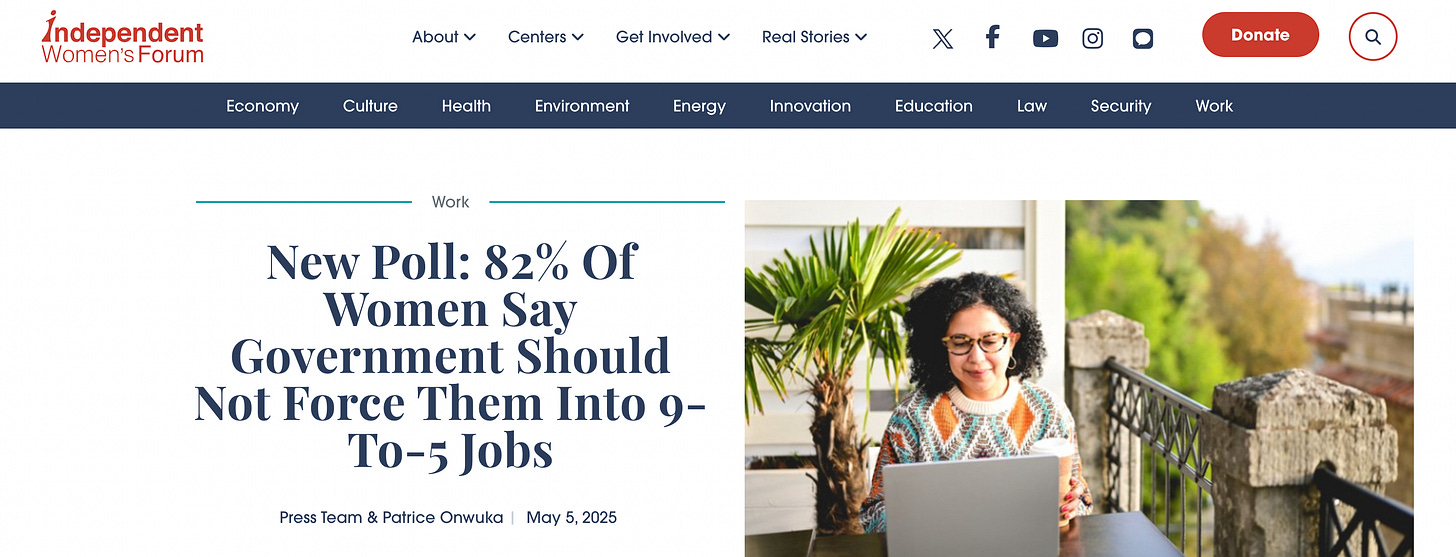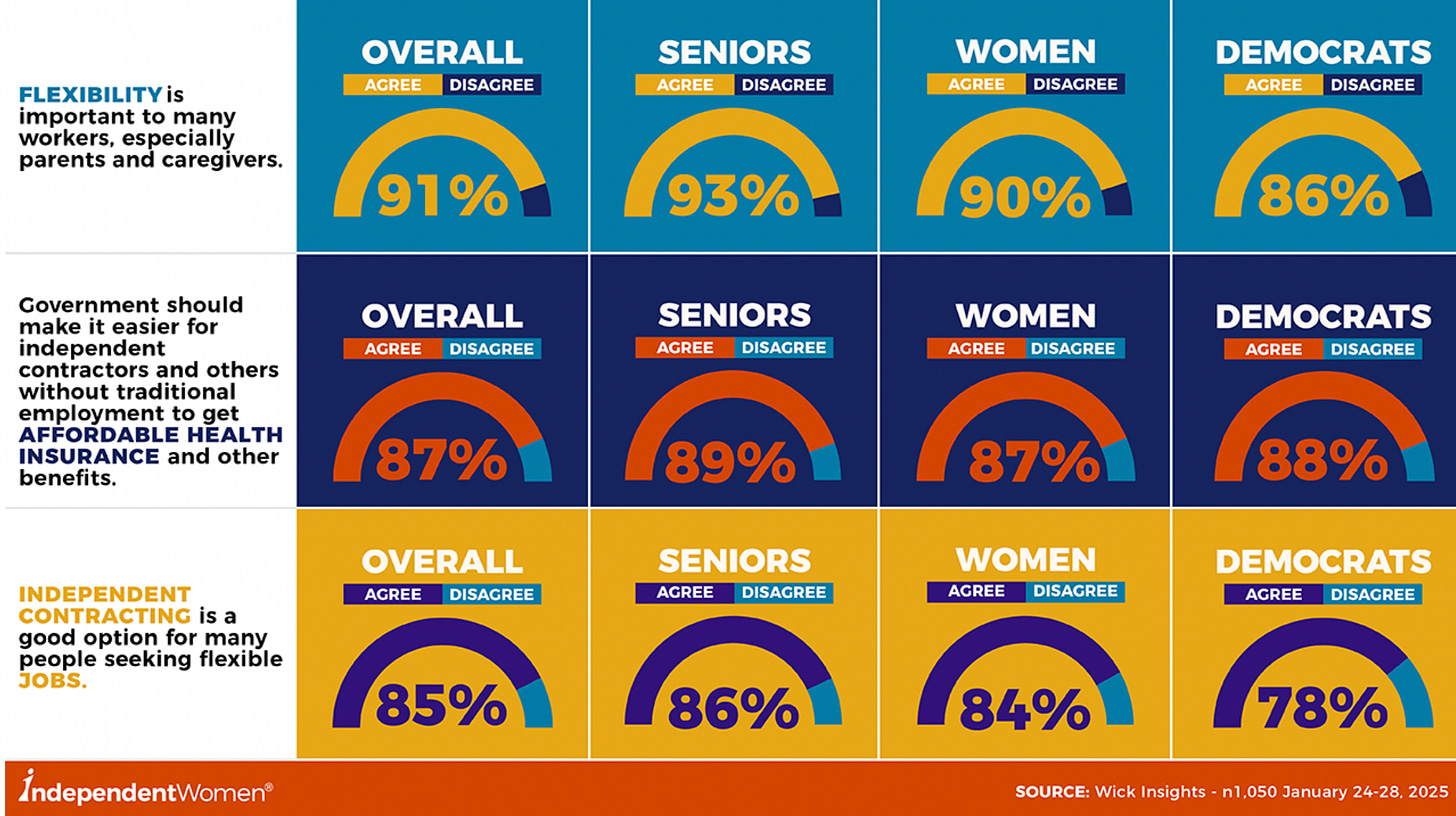Yet Again: 80/20
Another (yes, another) new study shows a strong majority that's firmly on the side of freedom to be an independent contractor.
Here’s a fun fact about testifying before Congress: One of the hardest things to do is keep a straight face when your opposition is speaking. The cameras are on, and the whole world is watching. No matter what the other witness says, you shouldn’t roll your eyes. You absolutely should not smile. And you’re definitely not supposed to laugh.
Maintaining that kind of composure can be hard. It took every ounce of willpower in my bone marrow to avoid doing a spit take last week as the National Employment Law Project’s Laura Padin—a recurring character straight out of Tropic Thunder in the freelance-busting brigade—tried to respond to my testimony.
Allow me to set the scene: I had just told lawmakers that the latest research from the U.S. Bureau of Labor Statistics showed yet again that if you listen to actual independent contractors, supporting our freedom to be our own bosses is an 80/20 issue. In contrast to that legitimately new data, some of what NELP—a union-backed think tank—has been peddling as “new” research is based on data as old as 1984.
That part of my testimony was a grenade I intentionally lobbed into Padin’s lap. Her passionate response was that we shouldn’t look at that old data from NELP’s footnotes. Instead, she quite predictably urged lawmakers to focus on another study that supports NELP’s “recent” findings, along with state-level data that NELP uses as the basis for its research.
I had anticipated that counterattack, and was ready to discredit it, too. A few minutes later, I detailed how this other research that underpins NELP’s “new” reports is also hopelessly old—it was done in the 1990s—and how my home state of New Jersey’s report that ended up as a footnoted source in NELP’s “new” research from the states actually begins with data that has no discernible basis in fact.
None of that stopped Padin’s Oscar-worthy performance for the cameras, which included asking quite forcefully—she was not going to surrender this hill, dammit!—if I would join her in petitioning the federal government for a new taxpayer-funded study about independent contractors.
I admit, at that point, I may have briefly gurgled a guffaw.
It truly was a test of my internal fortitude not to bust a gut laughing. My own written testimony included not one, but two recent sets of taxpayer-funded federal data, one that the U.S. Bureau of Labor Statistics put out just six months ago, and one that the U.S. Census released last year.
The freelance-busting brigade’s problem isn’t a lack of new research. It’s that the research from this century says things they simply don’t like, things like this about independent contracting being an 80/20 issue that they’re on the wrong side of:
That kind of government data, for quite a lot of years now, has been released amid a host of privately funded studies, surveys and polls that show similar patterns from all kinds of angles. I had more than two pages of bullet points from some of the newest research in my written testimony, and my fellow freelancers and I maintain a running list of research from 2015 to the present on the Fight For Freelancers website.
Last time I counted, there were about 80 linked sources on that Fight For Freelancers page. And yes, some of them are from the government, along with other respected sources: U.S. Government Accountability Office, U.S. Small Business Administration Office of Advocacy, U.S. Treasury Department Office of Tax Analysis, U.S. Federal Reserve Survey of Consumer Finances, Gallup, Pew Research Center, AARP, UCLA Health, Harvard Business Review Analytic Services, McKinsey & Company, Bloomberg, American Express, Wells Fargo and more.
Now, we can add yet another data set to this undeniably enormous mountain of evidence from a little ol’ place that I like to call reality.
This new data set comes from the Independent Women’s Forum, whose poll results from earlier this month start with this:
And then go on to add all of this:
As I read through this new poll’s results, I felt as if the pollsters who worked with Independent Women’s Forum, from Wick Insights, were seeing into my soul. They may as well have been stacking up response after response to support precisely what I had testified before Congress.
Patrice Onwuka, director of the Independent Women’s Center for Economic Opportunity, echoed what I told Congress in her statement that was released with this new research:
“Independent contracting is wildly popular. Millions of entrepreneurs, freelancers, and gig workers are earning incomes on their own terms and around their priorities. This polling not only underscores the value Americans place on flexible work, but it illuminates that Americans do not want the government to crack down on their right to work for themselves.”
I wanted to see under the hood of these new poll results, so I asked Onwuka to send me more information about how the poll was done—and I learned something that should give serious pause to lawmakers from both sides of the aisle who continue to support deeply misguided freelance-busting policies.
Political Findings
Two questions in the new Independent Women’s Forum polling made me think not only about what happened in last week’s congressional hearing, but also back to late 2021, when Pew Research Center released some findings about “gig work.”
Pew’s research was specific to app-based work like rideshare and food delivery, the kind of work that comprises less than 10% of independent contracting nationwide. Still, that Pew data showed a gaping chasm in the ways that Democrats think about independent contractors compared to independent contractors themselves and Republicans—exactly the kind of bias we yet again saw on display before Congress last week.
Pew wrote in 2021:
“This survey asked Americans for their views on this issue—and a majority (62%) say the most appropriate way to describe ride-hailing drivers is as independent contractors providing a service on behalf of the apps or websites. Smaller shares (35%) say these drivers are best described as employees who work directly for these platforms.
“While a minority of Americans view these drivers as employees regardless of political affiliation, the balance in views varies by party. Democrats and those who lean toward the Democratic Party are more likely than Republicans and GOP leaners to say drivers are most appropriately described as employees—a 19 percentage point difference.”
That 19-point gap represents a politically polarized canyon. As just one comparison, when Pew asked Republicans and Democrats if abortion was morally wrong in all cases, there was only a 14-point swing.
Having seen that Pew research about independent contractors in 2021, I was not surprised that the new polling by Independent Women’s Forum revealed a decent-size divide between Republicans and Democrats in response to this statement:
“Independent contracting is a good option for many people seeking flexible jobs.”
A little more than 51% of Republicans strongly agreed with that statement, but only 39% of Democrats.
Even still, when it comes to that same statement, if you combine the responses in the new poll for “strongly agree” and “somewhat agree,” we’re right back at 80/20 territory from respondents who identify with both political parties: 87.8% of Republicans and 79.2% of Democrats say independent contracting is a good option for many people seeking flexible jobs.
And when the question was posed in a way that would directly affect the kind of policy-making that Padin and I were arguing about in front of Congress last week, the numbers in the Democratic column went up even higher—toward our side, and away from hers.
Independent Women’s Forum asked people how they felt about this statement:
“The government should not force people to work 9 to 5 jobs, but allow people the flexibility to be an independent contractor.”
On that one, 45.3% of Republicans and 42.5% of Democrats said “strongly agree.” Combined with “somewhat agree,” the breakdown was 83% and 79.8%, respectively.
Yet again, we are at an 80/20 issue among everyday people in both political parties—even though, as last week’s congressional hearing sadly demonstrated yet again, policy-making around this issue remains highly partisan.
1950s vs. 2025
One of the people who referred to bona fide new data at last week’s hearing on Capitol Hill was Congressman Randy Fine, a Republican from Florida.
Fine talked about how MBO Partners found that the number of independent contractors making more than $100,000 rose in 2024 to 4.7 million from 4.6 million, up sharply from 3 million in 2020.
By contrast, at the end of last week’s congressional hearing, Congressman Mark Takano of California, the ranking Democrat on the dais, continued to suggest that all of us independent contractors would still be better off in traditional union jobs from 50, 60 or 70 years ago:
“Now, people say this is about choice, it’s about the freedom to choose. Well, let’s understand that good-paying jobs that pay a living wage, that have health care, that have the protections of the Fair Labor Standards Act, meaning overtime pay, meaning safe working conditions, meaning that you can organize and have the benefits of the union—and there’s all this fetishization over the good union, the manufacturing jobs that we had during the 1960s and ’70s and the ’50s, but let’s remember that a greater share of those jobs were because unions had greater strength in our country, and workers were able to organize, and unions helped Americans get jobs that allowed them to sustain a family. That type of job is less and less available today.
“Independent contract work, if that’s all that ordinary Americans are able to have, it’s not going to be sustainable and they’re not going to have the ability to meet the expenses of all the things they need to do to be an independent contractor.”
For the record, I’ve been a full-on independent contractor since 2003. I fall into the category that Upwork reported last month: earning more than our counterparts who have full-time, traditional jobs.
And nobody at last week’s hearing—or any hearing I’ve seen at the state and federal levels since 2019—has suggested that independent contracting should be the only type of available work.
Instead, what I’ve seen people say again and again is that those of us who prefer to be independent contractors want our government to support us in our choices and stop trying to shut down this pathway to achieving the American dream.
To that point, the lawmaker who got the final word at last week’s hearing was Chairman Ryan Mackenzie, a Republican from Pennsylvania. In his closing statement, Mackenzie said:
“What I see on display is that our party, the Republicans, want to support a wide array of job options that are out there for people. We support good-paying, full-time jobs with benefits—that is the overwhelming majority of people in this country, and that works for so many people—but it doesn’t work for everybody.
“And for those other individuals that want to choose to be an independent contractor or a freelancer or participate in the gig economy, they are making that choice because the benefits outweigh all of the negatives or perceived negatives that our opposition has towards these jobs.”
Shortly after that, Congressman Mackenzie ended the hearing, whose title was “Empowering the Modern Worker.” The cameras shut off, and I turned around to scan the faces of all the people who had been sitting behind me in the gallery. I wanted to gauge what they thought.
A solid 80% were smiling.




